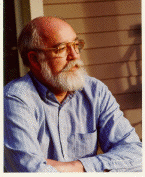

Thursday, 17 September 1998
Distinguished Arts and Sciences Professor,
Professor of Philosophy, and
Director, Center for Cognitive Studies
Tufts University
Modeling Creativity:
Some Speculations about the Speed of Thought
4:00 pm, Wean Hall 7500
3:45 pm - Refreshments Outside Wean Hall 7500

Reflections on both the successes and limitations of Artificial Life and AI models of creative processes suggest that there may be some barriers that will inevitably confront those trying to make computer models of creativity. There is nothing mysterious or anti-materialist about these barriers, but they do suggest that the very features that have made computer modeling a revolutionary enhancement of our scientific powers promise diminishing returns when applied to creativity.
SPEAKER BIO
Daniel C. Dennett, the author of Darwin's Dangerous Idea (Simon &Schuster,
1995), is Distinguished Arts and Sciences Professor, Professor of
Philosophy, and Director of the Center for Cognitive Studies at Tufts
University. He lives with his wife in North Andover, Massachusetts, and has
a daughter, a son, and a grandson. He was born in Boston in 1942, the son of
a historian by the same name, and received his B.A. in philosophy from
Harvard in 1963. He then went to Oxford to work with Gilbert Ryle, under
whose supervision he completed the D.Phil. in philosophy in 1965. He taught
at U.C. Irvine from 1965 to 1971, when he moved to Tufts, where he has
taught ever since, aside from periods visiting at Harvard, Pittsburgh,
Oxford, and the Ecole Normal Superieur in Paris.
His first book, Content and Consciousness, appeared in 1969, followed by Brainstorms (1978), Elbow Room (1984), The Intentional Stance (1987), Consciousness Explained (1991), Darwin's Dangerous Idea (1995), and Kinds of Minds (1996). He co-edited The Mind's I with Douglas Hofstadter in 1981. He is the author of over a hundred scholarly articles on various aspects on the mind, published in journals ranging from Artificial Intelligence and Behavioral and Brain Sciences to Poetics Today and the Journal of Aesthetics and Art Criticism. His next book, Brainchildren: A Collection of Essays 1984-1996 (MIT Press), is forthcoming in 1997.
He gave the John Locke Lectures at Oxford in 1983, the Gavid David Young Lectures at Adelaide, Australia, in 1985, and the Tanner Lecture at Michigan in 1986, among many others. he has received two Guggenheim Fellowships, a Fulbright Fellowship, and a Fellowship at the Center for Advanced Studies in Behavioral Science. He was elected to the American Academy of Arts and Sciences in 1987.
He was the Co-founder (in 1985) and Co-director of the Curricular Software Studio at Tufts, and has helped to design museum exhibits on computers for the Smithsonian Institution, the Museum of Science in Boston, and the Computer Museum in Boston.
He spends most of his summers on his farm in Maine, where he harvests blueberries, hay and timber, and makes Normandy cider wine, when he is not sailing. He is also a sculptor.